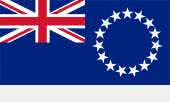Geography, Population, Languages
The Cook Islands are a group of 15 islands located in the Central Pacific, in Polynesia, between Tahiti in the east and Samoa and Tonga in the west. The total area of the Islands is 241 sq. km. The main island of Rarotonga is 3,000-km north-east of Auckland, New Zealand. The township of Avarua on Rarotonga is the administrative and commercial centre of the Cook Islands. The climate is tropical and humid and there are frequent hurricanes. The total population of the Island group is approximately 21,000. The indigenous population is Polynesian, but English is spoken by most of the community. The official language is English; Cook Islands Maori is widely spoken.
History, Political Structure and Law
The Islands were discovered by Captain Cook 1773-74 and named after him. Great Britain proclaimed a Protectorate over the Cook Islands in 1888. In 1901 the Islands were ceded to New Zealand. Since obtaining self-government in 1965 under the Cook Islands Constitutional Act 1964, the Cook Islanders have retained New Zealand citizenship, and New Zealand retains responsibility for foreign affairs and defence. The Government has reaffirmed continuing support and encouragement for the development of Rarotonga as a financial centre.
Government of the islands is carried out by a locally elected Parliament consisting of 24 members, however, executive authority is vested in Her Majesty, the Queen of England, in her capacity as Head of the Commonwealth. The Queen’s Representative is appointed upon the advice of the Cook Islands Government. Executive power is exercised by a Cabinet comprising the Prime Minister and nine other Ministers appointed by the Prime Minister. There are two main political parties, the Democratic Alliance and the Cook Islands Party which share seats in the Parliament. Both parties support the Cook Islands’ status as an offshore financial centre.
The Cook Islands have a growing international stature and are members of the South Pacific Forum, the Asian Development Bank and the Economic Commission for Asia and the Pacific.
The legal system is Common Law and is closely based on English Common Law.
Economy and Infrastructure
The Cook Islands economy is primarily based on tourism and fishing. In recent years the offshore industry has expanded enormously due to the innovative and progressive legislation, which facilitates the establishment of numerous offshore structures, such as international business companies, offshore banks, offshore insurance companies and wealth preservation trusts.
Rarotonga has a highly developed communication system, with satellite telephone, the Internet, e-mail and fax facilities. Direct dialling to Rarotonga is available from most countries. New Zealand Airlines fly via Rarotonga to and from Auckland, Tahiti, Hawaii, Los Angeles and Fiji, and provide direct access to the USA, South East Asia and Australia, as well as Europe.
The currency in the Cook Islands is the New Zealand Dollar (NZD). Cook Islands dollar is also used. Exchange control is exercised only in relation to certain dealings in NZD. There are no local restrictions on the movement of funds to or from the Cook Islands in other currencies. Businesses can be run in any currency.
Company Incorporation
The principal corporate legislation is The International Companies Act of 1981-1982.
The following types of International Company exist in the Cook Islands:
- No-liability Companies
- Companies Limited by Share or by Guarantee
- Unlimited Companies
- Mutual Companies.
A Cook Islands International Company has the same powers as a natural person. English is the official language of legislation and corporate documentation.
The following restrictions apply to a company’s trading and business activities:
- A Company cannot trade within the Cook Islands;
- A Company cannot engage in the business of banking or insurance unless licensed under the Offshore Banking Act or the Offshore Insurance Act.
The incorporation procedure involves filing the Memorandum of Incorporation with the Registrar of International Companies. As a matter of local company law, the company must maintain a registered office address within the Cook Islands and must also appoint a Cook Islands resident as registered agent. Off-the-shelf companies are available.
Company names are subject to the following requirements:
- A name can be in any language, but must be accompanied by a translation into English.
- A name must not be similar to that of a Company that has already been incorporated.
- A Company name should have the suffix “Limited” or “Ltd.” to denote limited liability.
The minimum number of directors is one. Directors may be either a body corporate or a natural person. They may be of any nationality and need not be resident in the Cook Islands. A Cook Islands resident Company secretary must be appointed. A minimum of one shareholder is required. No details of shareholders appear on the public files.
There are no requirements with regard to minimum issued share capital. The following classes of shares are permitted: bearer shares, preference shares, redeemable shares, shares with or without voting rights and shares without par value.
Annual Taxation and Fees
International entities including International Companies are exempt from taxation.
The sum of US$ 300 must be paid when the company registers, and annually thereafter.
Financial statements: all companies must lodge annual returns accompanied by audited accounts; however, this requirement can be dispensed with by company resolution.
